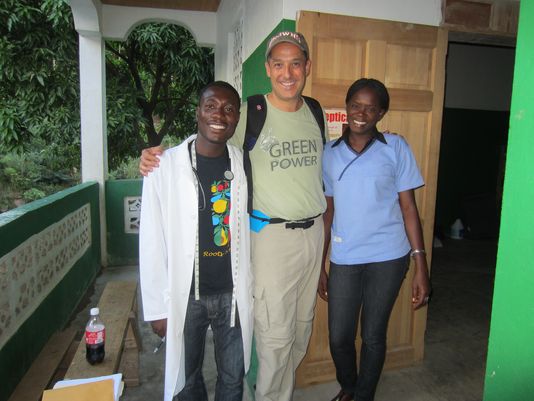First person: Local doctor touched by trip to Haiti
Poughkeepsie Journal – Editor’s note: Local physician Dr. Dan Katz was among a contingent that traveled to Haiti last month to offer medical assistance at a clinic. For many Haitians, this clinic provides the first medical care of their life. Here, Katz shares his experiences.
Following hours of four-wheel driving on a rocky riverbed, we faced a two-hour climb to Chermaitre. Children came down the trail to greet us, their bright, inquisitive eyes reflecting such curiosity. A few reached for our hands to lead us upward, chattering and laughing with unbridled innocence and excitement. As (Vassar alumna Carly Ritter) and I turned one steep corner, we heard a commotion. Turning around, we saw two women racing barefoot up the mountain toward us. They hugged and kissed us in joyous welcome.
Haiti began to infiltrate my soul.
This October, I joined four others on the Vassar College Haiti Project’s annual fall trip to Haiti. Co-founders Lila and Andrew Meade, Ritter, and project student President Tamsin Chen rounded out the team. When I returned, one of the first things people asked me was, “How was your trip?” Rarely at a loss for words, I found myself struggling to answer. I am still processing what I am feeling.
I was asked a few years ago to join VHP’s Medical Advisory Board, chaired by friend and retired Vassar Medical Center CEO Dr. Daniel Aronzon. While I knew Lila and Andrew and was impressed with their work, I was not personally aware of just how important they are to the people of Chermaitre, Haiti, and our community here in New York.
Art sales help VHP support hundreds of Haitian artists, and in turn help fund education, health care, water access and purification, reforestation and women’s initiatives in Chermaitre, which VHP has partnered with since 2001. This organization is run almost entirely by student volunteers, who in turn receive a life-changing experiential education in global citizenship.
We were in Haiti to assess the clinic funded and built by VHP, which had been running regularly for six months. We were also there to check on other ongoing initiatives, such as reforestation and an amazing new women’s cooperative.
We reached Chermaitre drenched in sweat and exhausted, just as night fell. Haitians routinely make this intense round trip, just to come to school, or to see the doctor, or to fill a bucket up with water. Incredible!
We hiked higher up the mountain the next day and came across a shack and an elderly lady with painfully swollen legs, crying “malad,” — Creole for “sick.” Our clinic’s doctor, Gueslin Joassainvil, our Haitian medical student, Peter Lylord, and I performed a brief history and physical exam, diagnosed her with probable heart failure and two days later sent medicine up the mountain. Now that’s a house call!
After two glorious days and pitch-black nights with no electricity, it was time for us to descend. Although I had only just arrived in Chermaitre, I already was profoundly moved by the welcoming and graceful people — women, children, leaders, teachers — and was deeply saddened about leaving. I took a moment to inscribe Chermaitre firmly into my memory and then began the trek to the clinic.
We arrived after an hour and a half of hiking, drenched from the humid morning heat. We were passed along the way by dozens of sandal-clad or barefoot women and children, some carrying huge loads on their heads, all with perfect balance and graceful posture, not one of them breaking a sweat. It was astonishing.
About 30 children and 40 adults waited to be seen in the newly built two-room clinic.
Our nurse triaged patients all day in one room while Dr. Gueslin and I saw patients in the other. I observed Dr. Gueslin and fetched medicine from the “pharmacy,” a small room with sparsely stocked shelves. People waited with infinite patience for up to eight hours in the intense heat, without access to water. They waited for the most basic medical care — but it is care they had not known before the clinic opened.
It soon became apparent that we would not finish before darkness fell on the electricity-less clinic.
I began to see patients separately with our on-the-ground partner Pere Andre Wildaine acting as translator. There I was, a subspecialist urologist with all the latest technology at my fingertips in the United States, using a camping headlamp to evaluate scabies and head fungus! I was taking blood pressure and listening to hearts and lungs — and feeling overwhelmed.
Toward the end of the day, an elderly man came in and explained his ailment. Wildaine translated: “He says it hurts down there.” “Finally!” I exclaimed. It was a urologic issue. I quickly and easily fixed a painful problem, and the gentleman was greatly relieved.
After eight hours in the clinic, I was exhausted but honored and humbled that these people had trusted me, a total stranger from another land, with the intimate details of their health. After many years I was practicing medicine in its most basic, purest form.
And it was refreshing!
Click here to read the full Poughkeepsie Journal article.

